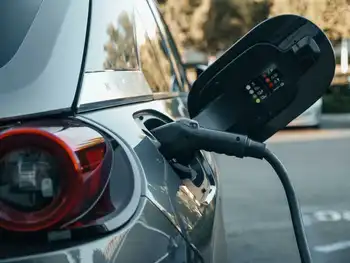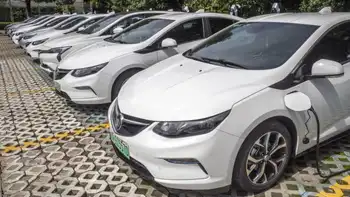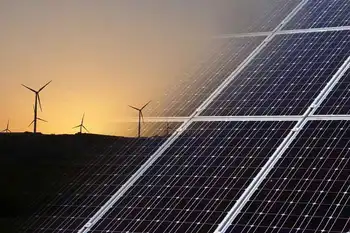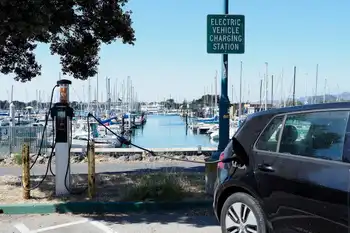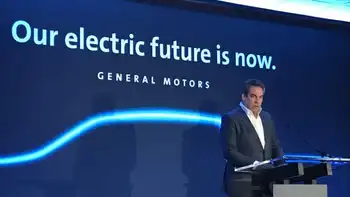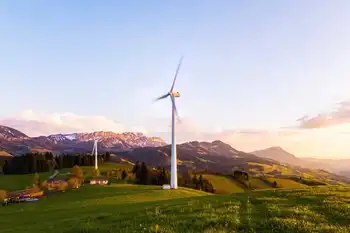Canada must commit to 100 per cent clean electricity

Protective Relay Training - Basic
Our customized live online or in‑person group training can be delivered to your staff at your location.

- Live Online
- 12 hours Instructor-led
- Group Training Available
Canada Green Investment Gap highlights lagging EV and clean energy funding as peers surge. With a green recovery budget pending, sustainable finance, green bonds, EV charging, hydrogen, and carbon capture are pivotal to decarbonization.
Key Points
Canada lags peers in EV and clean energy investment, urging faster budget and policy action to cut emissions.
✅ Per capita climate spend trails US and EU benchmarks
✅ EVs, hydrogen, charging need scaled funding now
✅ Strengthen sustainable finance, green bonds, disclosure
Canada is being outpaced on the international stage when it comes to green investments in electric vehicles and green energy solutions, environmental groups say.
The federal government has an opportunity to change course in about three weeks, when the Liberals table their first budget in over two years, the International Institute for Sustainable Development (IISD) argued in a new analysis endorsed by nine other climate action, ecology and conservation organizations.
“Canada’s international peers are ramping up commitments for green recovery, including significant investments from many European countries,” states the analysis, “Investing for Tomorrow, Today,” published March 29.
“To keep up with our global peers, sufficient investments and strengthened regulations, including EV sales regulations, must work in tandem to rapidly decarbonize all sectors of the Canadian economy.”
Deputy Prime Minister and Finance Minister Chrystia Freeland confirmed last week that the federal budget will be tabled April 19. The Liberals are expected to propose between $70 billion and $100 billion in fiscal stimulus to jolt the economy out of its pandemic doldrums.
The government teased a coming economic “green transformation” late last year when Freeland released the fall economic statement, promising to examine federal green bonds, border carbon adjustments and a sustainable finance market, with tweaks like tightening the climate-risk disclosure obligations of corporations.
The government has also proposed a wide range of green measures in its new climate plan released in December — which the think tank called the “most ambitious” in Canada’s history — including energy retrofit programs, boosting hydrogen and other alternative fuels, and rolling out carbon capture technology in a grid where 18% of electricity still came from fossil fuels in 2019.
But the possible “three-year stimulus package to jumpstart our recovery” mentioned in the fall economic statement came with the caveat that the COVID-19 virus would have to be “under control.” While vaccines are being administered, Canada is currently dealing with a rise of highly transmissible variants of the virus.
Freeland spoke with United States Vice-President Kamala Harris on March 25, highlighting potential Canada-U.S. collaboration on EVs alongside the “need to support entrepreneurs, small businesses, young people, low-wage and racialized workers, the care economy, and women” in the context of an economic recovery.
Biden is contemplating a climate recovery plan that could exceed US$2 trillion as Canada looks to capitalize on the U.S. auto pivot to EVs to spur domestic industry. Per capita, that is over 8 times what Canada has announced so far for climate-related spending in the wake of the pandemic, according to a new analysis from green groups.
U.S. President Joe Biden is contemplating a climate and clean energy recovery plan that could “exceed US$2 trillion,” White House officials told reporters this month. “Per capita, that is over eight times what Canada has announced so far for climate-related spending in the wake of the pandemic,” the IISD-led analysis stated.
Biden’s election platform commitment of $508 billion over 10 years in clean energy was also seen as “significantly higher per capita than Canada’s recent commitments.”
Since October 2020, Canada has announced $36 billion in new climate-focused funding, a 2035 EV mandate and other measures, the groups found. By comparison, they noted, a political agreement in Europe proposed that a minimum of 37 per cent of investments in each national recovery plan should support climate action. France and Germany have also committed tens of billions of dollars to support clean hydrogen.
As for electric vehicles (EVs), the United Kingdom has committed $4.9 billion, while Germany has put up $7.5 billion to expand EV adoption and charging infrastructure and sweeten incentive programs for prospective buyers, complementing Canada’s ambitious EV goals announced domestically. The U.K. has also committed $3.5 billion for bike lanes and other active transportation, the groups noted.
Canada announced $400 million over five years this month for a new network of bike lanes, paths, trails and bridges, the first federal fund dedicated to active transportation.





